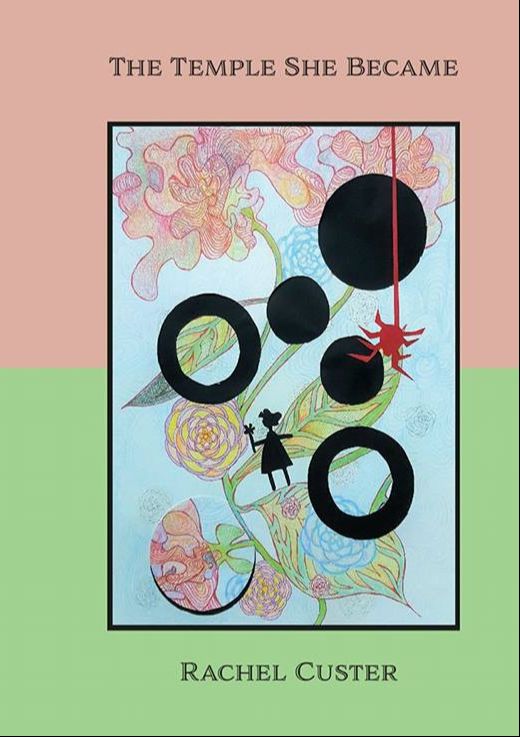|
In The Temple She Became, Rachel Custer writes from a place where growing up was often less about what one wanted to do than what one had to do. Family and childhood, the surrounding fields, dark woods, crop land, the house itself, all require some heavy lifting, some wild howls and growing pains, questions of faith and vice, fear and bravado, wonderment and containment, casting out, reeling in. We are drawn into a world where "The children set tiny fires inside their mouths." We find a possum named after George Jones, in "those spaces between buildings, filled with night" we locate fear when it is young and full of awe, attentive, dreaming at windows, listening for what moves underneath a house and might possibly even find its way in. Still, Custer reminds us, younger/older, the distance between the two, "there were those spaces, large and dark as the distance between a word and what is meant." A father's reassurance there is nothing to fear from this thing, but there are so many floorboards beneath which fear finds a place to stay. How do children rework their world, what draws them in, like a moth around a flame, to the mysterious skin of life that they find, both fascinating and scary, and, perhaps, some unnameable place between the two? in Softly Spoken we read: "whisper a cornfield whisper water disappearing whisper a girl curling herself into a dust mote dinner will require a good deal more killing" A lot of heavy, necessary lifting, adults and the oldest siblings confronting a harsh landscape, where things must be tended to in order for fruit to bear out. No basket that wasn't first filled by calloused hands ever ran over with anything. There are buzzards and Chevy's serving as altars, corncobs and muskmelon guts, compost buckets: "you learn there are things that bloom outside of choice, or even prayer - like sometimes, roots and all, you just give up." In Schaulust, we read of "That feeling - the pleasure in seeing what we should not." A child aching to get at the forbidden, to crack its secret wide open and create oneself anew with both prosaic and seemingly forbidden knowledge. "don’t touch me don't touch me I’m blooming" Faith moves in and out of the rooms of this temple, some doubts, some questions, but always of a love which is something like a quiet heart waiting to be touched, broken open by an unseen but absolutely felt creator. "God is in the monotony we might worship if we could just learn to sit still." And then a rebellious teenager's voice: "Jesus, I want a cigarette. Or “Jesus? I want a cigarette.” Or want Jesus, or anything, really - I keep searching for punctuation" A concern for the place of the poem, its credentials, its deserving, crop up occasionally, enough to make us want to ask why the doubt in oneself through the poem, are the people and place thought to be undeserving? By whom? "When we were children, my Daddy made us a play room out of a meat locker. You see? Who am I to write poems?" Another question arises with the title Nothing Happened That Was Worthy of Poetry, not exactly of needing permission, but of wondering if this world is what they mean when they speak of the lyrical vocation: "we ran one after the other toward a gas station - ended up locked against the night you fucked me for thirty-eight minutes the exact length of history’s shortest war" This may be a place where there were neither many poets or people who read poetry, but weren't their lives already something like moving poems, if all these experiences ended up here on the page, and the lovers, the misadventures, the father who build's a playroom out of a meat locker for his kids to romp and giggle in, the thick dark woods of the country, and something or someone, here in this place that says, though unbelievable, in the end, because one has survived to write this poem and deny the vicious, nay-saying voice "Again, and again, whispers the world, you are nothing special, you are common as a household carp." But no. One is more than that. Custer insists that there is so much to see here if we only dare or care to see it. Do we care? The question arises can you see, feel, this place? I mean really see/feel it? Will you let this place be a poem? No, your permission isn't needed, but doubt is nonetheless infused into life, cigarette or Jesus, where is the need located in this moment, and now, a second later, has it already become something else? "You say to yourself I am not a carp" You turn your head another direction when the world begins to whisper "you are nothing special" "this is what you do: say no" This place and I are temples in the making. A lot of hard work built this world, so too this book. These poems live their experience and cannot apologize for what is hard to take; life itself. No life is gotten through without calloused hands, no book ever ran over with poems that felt right and real as this without effort. This is a book worth reading because the lives in it are not carp, they are something special. The Temple She Became by Rachel Custer is available for pre-order now from Five Oaks Press five-oaks-press.com/2017/07/18/the-temple-she-became-rachel-custer/ 7/26/2017 04:44:24 pm
I cried. James, this is beautiful. What a gift. Thank you.
James Diaz
7/26/2017 04:52:40 pm
I'm so glad you liked it Rachel. Your book is so moving and necessary, I loved each poem in it as if they were old friends. Comments are closed.
|
AuthorWrite something about yourself. No need to be fancy, just an overview. Archives
April 2024
Categories |

 RSS Feed
RSS Feed
